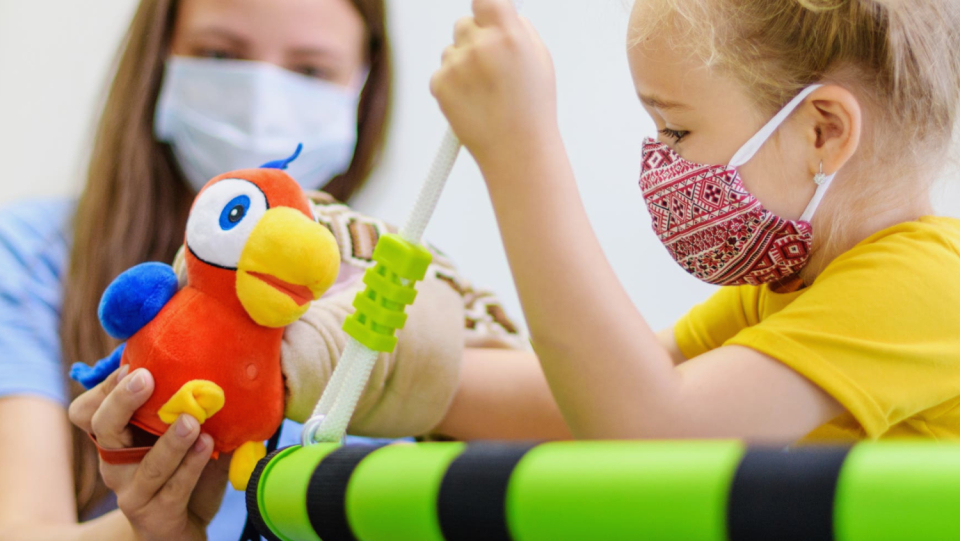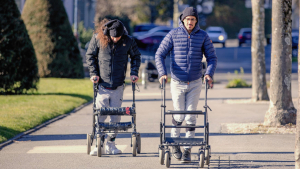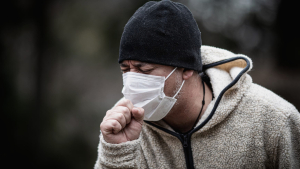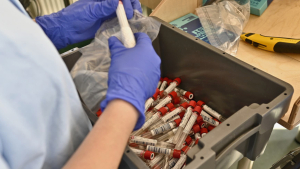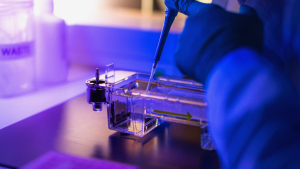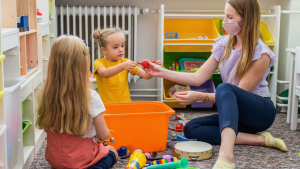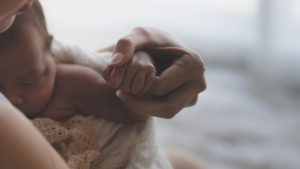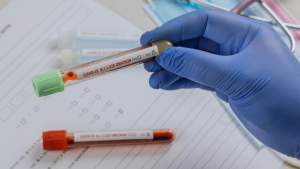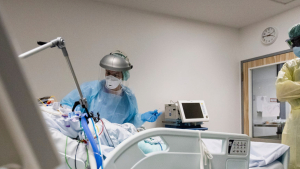When the Coronavirus crept into the Dani Dumitriu children's ward for the first time, the pediatrician, like many colleagues, first paid attention to the consequences and side effects of the infection. After all, it is known that some viruses, such as Zika, can harm newborns. Most babies in the hospital are quite good Covid-19, Dumitriu, like other doctors, stated relieved.
Soon after, however, an elusive but worrying trend intensified. Dumitriu and her team at the Presbyterian Morgan Stanley Children's Hospital in New York City had evaluated data that they had collected over two years: Since the end of 2017, the team has been observing the development, communication behavior and motor skills of infants up to six months old.
Dumitriu thought that it could be worth comparing the results of children born before and during pandemic. So she asked her colleague Morgan Firestein from Columbia University to look at the neurological development between the two groups after any differences.
After a few days later, Firestein called back rather startled. "She said, 'We're in a crisis! I don't know what to do: the pandemic has an impact, and a significant one at that!'" recalls Dumitriu. She spent a few nights analyzing the data. In fact, children born during the pandemic performed worse on tests of gross and fine motor skills and communication skills than their peers born before the pandemic. For both groups, the parents had collected data with the help of a predetermined questionnaire.
It did not matter for the result whether the parents of the children themselves were infected with the virus or not: it was not the infection, but some pandemic-related change in the environment that seemed to be the trigger. Dumitriu was as if struck in the head: "We thought," she recalls, "my God, here we are talking about hundreds of millions of babies!«
In general, many people are doing quite well with SARS-COV-2 acute infected children. However, the first research results indicate that the panda miebe -related stress during pregnancy may have negatively influenced the development of the brain of babies in the womb. It could also be that stressed parents and supervisors interact differently or less with their young children, which may affect physical and mental abilities. As so often, social and economic inequalities should clearly determine how individuals are affected by the health side effects of pandemic.
Lockdowns could also have had an impact: they were instrumental in controlling the spread of the coronavirus; at the same time, however, they forced young families into greater isolation, which may have led to less time to play together with friends and siblings and to less frequent social contact. Many stressed and overwhelmed caregivers may not have been able to devote themselves to babies and toddlers as extensively as they should.
It's crucial to give your time.
How all of this affects child development, the parent-child relationships and relationships with peers-"everyone wanted to find out," says developmental psychologist James Griffin: Everyone is worried. A few teams have published the first results of the examination; Further studies have started, but unique answers are difficult to find.
This is not least due to the fact that many developmental psychology research institutions closed during the pandemic. Not so the Advanced Baby Imaging Lab at Brown University: It remained open during the Covid-19 pandemic – with a little less visitor traffic and slightly increased hygiene rules. Medical biophysicist Sean Deoni and his colleagues are using magnetic resonance imaging (MRI) and other techniques to investigate how environmental factors influence brain development in infants. They test the motor, visual and language skills of babies in the laboratory; Part of a seven-year study by the National Institutes of Health of the USA on early childhood development and its effects on later health.
Over the course of the pandemic, Deoni gradually received more worrying comments from his colleagues. "Our staff told me anecdotally, "Man, these kids take a lot longer to take the tests,"" Deoni recalls. Having become attentive, he asked his team to systematically compare the average neurodevelopmental values of children from year to year and look for deviations.
It turned out that the results were significantly worse during pandemic than in the years before. "The results suck into the basement from the end of the last and beginning of this year," he said at the end of 2021. When comparing all participants, the pandemic babies performed almost two standard deviations in a series of IQ-Test-like measurements than that Corona pages. Children from low -income families had the greatest losses, boys were affected more than girls, and overall the gross motor skills were affected.
At first, Deoni assumed that there was a bias behind the results due to a very special group of children tested: Had it been families whose children had already noticed or threatened developmental problems that applied for the test during the pandemic? Deoni ruled this out over time: The children who came to the examination did not differ in origin, birth events or socioeconomic status from the participants of previous years. Their deficits, according to a worrying trend in the evaluation, also accumulated with the duration of the pandemic. Simply frightening," says Deoni.
Will this endure?
The effects have a drastic effect. After all, they could only be temporary. In addition, predictions about long -term problems could not be drawn from it, other researchers point out. It is really difficult to say what this means for the future of the babies, says developmental psychologist Marion van den Heuvel from the University of Tilburg in the Netherlands. Because: "The IQ of infants does not predict much." This proves, for example, a study on the development of girls who initially lived in orphans in Romania and then adopted by foster families before the age of 2.5 years. At the age of 4.5, these rare psychiatric problems were housed as girls who were accommodated in homes. This situation differs from a pandemic, but the observation suggests that hardening that the babies experience could compensate for later if the problematic triggers have disappeared.
Deoni is currently revising his results for a publication in »JAMA Pediatrics«. Initially, he published the work on a preprint server, prompting a flood of concerned media reports and reactions from the research community. There was "real concern that these findings were published without proper peer review," says Griffin, who directs the developmental psychology department at the National Institute of Child Health and Human Development in Bethesda.
But assuming that the results finally turn out to be valid: Why should the babies born during pandemic to show cognitive and especially motor deficits?
Deoni suspects the problems could be due to a lack of interpersonal interaction. He and his team are checking this in follow-up studies that have not yet been published, documenting the interaction of parents and children at home. As it turns out, the number of words exchanged between father, mother and children has decreased in the last two years compared to the time before. Perhaps, Deoni speculates, infants and toddlers get fewer opportunities to train their gross motor skills than usual because they don't regularly romp around with other children or go to playgrounds. That would be an unfortunate development, because the skills otherwise trained "form a foundation for everyone else," says Deoni.
The danger of slowed development due to a lack of interactions with peers seems real, as other research results suggest. For a study published at the beginning of 2022, researchers in the United Kingdom asked 189 parents of children aged eight months to three years whether their children had attended a daycare or preschool during the pandemic, in order to then test the children's language and executive skills. They performed better if they were cared for in a group during the pandemic.
This still had a significant impact in children from low -income layers. In addition to these children, those with non -white skin seem at risk. Appropriately, more and more research results indicate that long-term lessons in school-age children further strengthen the already existing learning and development differences; For example, those between children from wealthy and low -income conditions or different skin color.
In the Netherlands, researchers found that children performed worse in 2020 on nationwide tests of learning progress than in the previous three years. For children from families that are difficult to reach by the formal education system, the effect was sometimes 60 percent stronger.
In various sub-Saharan African countries – such as Ethiopia, Kenya, Liberia, Tanzania and Uganda – some children may have lost the learning content of up to an entire school year, as studies show. For the USA, a study by the consulting company McKinsey after the first lockdown revealed that students with non–white skin color were three to five months behind at the start of school in the fall - and thus about one to three months more than their also lagging classmates with white skin color.
Does wearing masks in school and everyday life harm?
A number of studies have investigated whether emotional development has been altered by the ubiquitous face masks. Due to the pandemic, children regularly faced mouth-nose protection in schools or other group settings. The masks cover parts of the face that are important for the expression and visual communication of feelings and language – and so it was important to clarify whether it impairs the emotional and linguistic development of children if these signals are omitted under the mask.
The psychologist Edward Tronick from the University of Massachusetts in Boston has been bombarded by emails from parents and pediatricians with this question. Tronick is famous for his "Still Face" experiment: in 1975 he showed the reaction of infants to parents, who suddenly only interacted with a frozen, rigid facial expression with the babies. Typically, infants only try to get attention - but then, if the success does not go, gradually withdraw and react increasingly disturbed and suspicious.
During the pandemic, Tronick and his colleague Nancy Snidman investigated whether masks have a similar effect: In experiments, the psychologists evaluated smartphone videos that show parents interacting with their babies before, during and after putting on the face masks. Although the babies noticed when their parents put on the masks – they briefly changed their facial expressions, looked away or pointed at the mask – they continued to interact with their parents as before. The mask only blocks one communication channel, says Tronick: "The parent who wears a mask continues to say, 'I'm interacting with you, I'm still there for you, I'm still connected to you.'" The study by Tronick and Snidman has not yet been conclusively reviewed by peers.
The perception of language or emotional messages does not seem to be too affected by facial masks. A study published in May 2020 reports that two -year -old words understand well, the adults speak with opaque face masks. Children "compensate for information deficits easier than we think," says the main author of the study, the psychologist Leher Singh from National University of Singapore. US researchers determined that children in school age were less easy to classify the emotions of adults through facial masks: this will be as difficult as in adults with sunglasses. In essence, however, the children are largely true. "There are many other indications that children can use to recognize other people's feelings-such as the voice, posture, the context," says study author Ashley Ruba from the University of Wisconsin-Madison.
Pregnancy and the pandemic's stress
The pandemic could also affect the prenatal development of children. Various teams have been looking for clues in this direction, including psychologist Catherine Lebel, from the University of Calgary in Canada. Together with her colleagues, she interviewed more than 8000 pregnant women during the pandemic. Almost half reported suffering from anxiety symptoms, a third had symptoms of depression – a significantly higher percentage than in the years before the pandemic. How did this stress affect the babies in the womb?
To find out this, the researchers examined the brain of 75 babies three months after birth using imaging procedures in the magnetic resonance tomograph. In their preliminary publication published online in October 2021, they showed a difference: the mothers reported more prenatal stress than more frequent fear or depression symptoms, then their children often occurred certain differences in structural connections in the brain- that between the amygdala, a brain region that is involved in emotional processing, and the prefrontal cortex, an area that processes executive skills.
Previously, Lebel and her team had already noticed a link between prenatal depression and the same differences in brain connectivity in a smaller study. They hypothesized that these brain changes in boys correlate with aggressive and hyperactive preschooler behavior. Other researchers have studied connectivity changes in adults: There seems to be a risk factor for depression and anxiety.
The later development of children held in pandemic could also be influenced by prenatal stress. This is indicated by research like a study by the psychologist Livio Provenzi from the Irccs Mondino Foundation in Italy Pavia. His team observed twelve-week-old babies of mothers, who had given information about their stress and fear level during pregnancy. The evaluation showed that babies with more stressed and frightened parents at the age of three months were able to regulate emotions and attention less well - they lost their interest in social stimuli and were more difficult to calm down.
Moriah Thomason of the New York University Grossman School of Medicine is also investigating the effects of maternal stress on the child's brain and behavior in a separate study. It was not yet completed at the beginning of 2022. The child and adolescent psychologist emphasizes one point: Although there are all sorts of concerns about the possible effects of prenatal stress on infants born in the pandemic, it can by no means be deduced from the first early studies that babies will have problems for the rest of their lives. »Children are very adaptable and flexible. The situation will improve, and we expect that children will be able to cope well with many events," says Thomason. She does not expect to have to state at some point that the pandemic has allowed an entire generation of damaged children to grow up.
Research on the consequences of past disasters seems to confirm this: Stress in the womb can therefore be harmful to babies, but must not have any effects in the long run. This is evidenced by a study on the consequences of serious floods in the Australian Queensland 2011: Children of the mothers, which were significantly stressed in the course of the catastrophe became. But that changed over time: at the age of 30 months this effect was no longer recognizable. The more the toddlers also performed better the more the parents had responded to the needs of the babies.
What should I do when caution is advised?
Research on the consequences of the pandemic on babies at the beginning of 2022 provides a mixed, still preliminary picture: According to many scientists, it is still too early for reliable and meaningful interpretations. It could turn out that the first indications from early and unpublished studies are not confirmed in the end, says medical psychologist Catherine Monk, a colleague of Dimitriu at the New York Presbyterian. This could have various causes. It would be conceivable, for example, that those parents who decided to participate in initial studies did not form a representative sample. For example, they may have already noticed changes in children's behaviour and were therefore particularly worried. Perhaps it also had a small but disturbing influence that in pandemic times people had to wear face masks during psychological tests that required a personal appearance, says Monk.
In addition, the first, quickly carried out studies on the topic of incentive can be subject to particularly interesting results. Thomason already referred to this in an opinion in the journal "Jama Pediatrics" in 2021. Scientists are "quick when it comes to uncovering harmful changes. Such things attract attention in the media and they can be published in high -ranking magazines, «she says.
A clearer picture is likely to emerge from large studies and collaborations that are already being initiated by various researchers and funders. The US National Institute on Drug Abuse is funding studies as part of the Healthy Brain and Child Development Study, which investigates how maternal stress and drug use affect child development during the pandemic. Newly established networks and conferences will bring researchers together and promote the exchange of new data. In March 2020, Thomason had already launched the international COVID Generation Research Alliance: It addresses scientists who study families with young children during the pandemic. The alliance, which hosted a research summit in November 2021, includes researchers from 14 countries from North and South America to Europe, Australia, Asia, the Middle East and Africa.
Assistance with maturing and shedding
Even if the pandemic really changes children, the brains of six-month-old children are malleable, says Dumitriu, their development can be promoted, and there is enough time in any case to repair possible damage and avoid a public health crisis scenario. Parents can also contribute to this by regularly playing and talking to their toddlers and giving them the opportunity to interact with others in a safe environment. Funding programs to support families and children can also make a difference. Lebel's study shows that the prenatal burden of expectant mothers decreases significantly if they receive social support from close caregivers during pregnancy. Here, in and around the ecosystem of pregnancy care, there is still a lot of potential, says Monk.
In the end, research condensed that most children will probably put the side effects of pandemic away - if they will have to struggle more than before. In difficult cases, we should counteract as soon as possible, warns Deoni: »Children are undoubtedly very resistant, but we also know how important the first 1000 days in the life of a child are. The crucial foundations are formed here. ”At the beginning of 2022, the first pandemiebies born in March 2020 are over 650 days old. These children are a product of their surroundings, says Deoni: In the end, the decisive factor will make the input we give you how we play with you, read aloud to you and love you.
© Springer Nature 601, pp. 180–183, 2022







